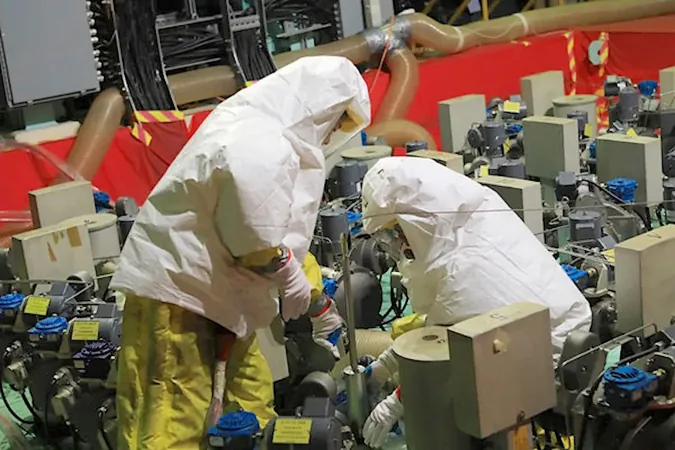
Revolutionary Discovery: How Cancer Steals Your Motivation and What We Can Do About It
2025-04-10
Author: Daniel
The Hidden Battle: Cancer's Impact on Motivation
Imagine facing a relentless enemy that not only attacks your body but also steals your will to live. Advanced cancer often plunges patients into an overwhelming apathy, a cruel twist that strips away interest in beloved activities. This phenomenon, known as cachexia, affects a staggering 80% of late-stage cancer patients, causing severe muscle wasting and drastic weight loss, leaving them frail despite adequate nutrition.
This erosion of motivation intensifies suffering and isolates patients from loved ones—making the already difficult journey of fighting cancer feel even lonelier. It complicates treatment adherence, as patients struggle to engage with therapies demanding persistence and effort.
Revisiting Common Assumptions about Apathy
Traditionally, doctors have viewed apathy in late-stage cancer patients as a psychological response to physical decline. But groundbreaking research suggests that this loss of motivation might be an integral part of the cancer experience itself. What if apathy isn’t just a symptom but a strategic maneuver by the disease?
A Groundbreaking Discovery in Mouse Research
In recent research published in the journal Science, scientists made a pivotal finding: cancer seems to hijack a specific brain circuit that governs motivation. Using advanced techniques in mouse models, researchers delved into the inflammation dynamics within the body and monitored brain activity throughout the progression of cancer.
They pinpointed a brain region known as the area postrema, a hub that detects inflammation. As tumors grow, they release cytokines—molecules that stimulate inflammation—into the bloodstream. This region, lacking the protective blood-brain barrier, directly senses these inflammatory signals, triggering a chain reaction that suppresses dopamine release in the nucleus accumbens, the brain’s motivation center.
The Motivation Crisis: A Closer Look at Mouse Behavior
Through carefully designed behavioral tests, researchers observed how cancer-afflicted mice shifted their approach to rewards. While they were still eager to pursue easy food, they abandoned tasks requiring greater effort as the disease progressed. Correspondingly, dopamine levels plummeted, mirroring the waning motivation.
Reclaiming Motivation: Promising Avenues for Treatment
The findings hold an electrifying promise: researchers discovered methods to restore motivation even as cancer continued its relentless advance. By genetically disrupting the inflammation-sensing neurons or stimulating dopamine release, they were able to revive normal motivational levels in mice.
Additionally, administering a cytokine-blocking drug—akin to existing arthritis medications—proved effective in rekindling the mice's desire to work for rewards, despite not reversing physical wasting.
A New Frontier for Cancer Treatment
While these results stem from mouse studies, they illuminate a potential treatment pathway for humans. Targeting this inflammation-dopamine circuit could enhance the quality of life for cancer patients, even amidst terminal conditions. This breakthrough brings forth a beacon of hope, suggesting that even as cancer ravages the body, the spark of motivation may still be reignited.
Implications Beyond Cancer: Apathy Across Chronic Diseases
This discovery transcends cancer, as the inflammatory molecules implicated in motivation loss are also present in numerous other ailments including autoimmune disorders, chronic infections, and depression. This same brain circuitry could elucidate the pervasive apathy experienced by millions grappling with chronic conditions.
Interestingly, this apathy may have evolved as a protective mechanism during acute infections, conserving energy by dampening motivation, but has turned detrimental in chronic scenarios like cancer.
A Hopeful Future for Patients and Families
While transforming these findings into therapeutic strategies for humans necessitates further research, the prospect of intercepting inflammatory signals or modulating brain circuits offers a glimmer of hope. For patients and families witnessing motivation fade, these discoveries suggest a compelling possibility: even in the face of disease progression, the essence of who we are can be reclaimed.



 Brasil (PT)
Brasil (PT)
 Canada (EN)
Canada (EN)
 Chile (ES)
Chile (ES)
 Česko (CS)
Česko (CS)
 대한민국 (KO)
대한민국 (KO)
 España (ES)
España (ES)
 France (FR)
France (FR)
 Hong Kong (EN)
Hong Kong (EN)
 Italia (IT)
Italia (IT)
 日本 (JA)
日本 (JA)
 Magyarország (HU)
Magyarország (HU)
 Norge (NO)
Norge (NO)
 Polska (PL)
Polska (PL)
 Schweiz (DE)
Schweiz (DE)
 Singapore (EN)
Singapore (EN)
 Sverige (SV)
Sverige (SV)
 Suomi (FI)
Suomi (FI)
 Türkiye (TR)
Türkiye (TR)
 الإمارات العربية المتحدة (AR)
الإمارات العربية المتحدة (AR)